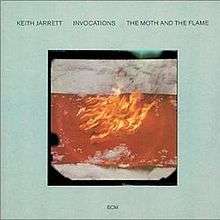Invocations/The Moth and the Flame
Invocations/The Moth and the Flame is a double album of improvised music performed by Keith Jarrett in two different sessions taking place in 1979 and 1980. Each album has a different approach, setting and conception. While in "Invocations" (recorded at the Benedictine Abbey in Ottobeuren, former West Germany) Jarrett plays soprano saxophone and Pipe Organ exclusively, "The Moth and the Flame" is a solo piano suite recorded at Tonstudio Bauer studios in Ludwigsburg (West Germany). This one-in-a-kind double-album was released by ECM Records in 1981.[1]
| Invocations/The Moth and the Flame | ||||
|---|---|---|---|---|
 | ||||
| Studio album by | ||||
| Released | 1981, May [1] | |||
| Recorded | 1979, November [2] 1980, October [3] | |||
| Venue | Tonstudio Bauer, Ludwigsburg (West Germany) Ottobeuren Abbey, Ottobeuren (West Germany) | |||
| Genre | Improvised music | |||
| Length | 1:22:21 | |||
| Label | ECM Records [ECM 1201/02] | |||
| Producer | Manfred Eicher | |||
| Keith Jarrett chronology | ||||
| ||||
| Keith Jarrett solo piano chronology | ||||
| ||||
Original notes
As in other Jarett's works, the album is accompanied by some poetry. Strangely enough, the included poem "When things are heard" by Rumi (translated by Robert Bly)[4] is not attributed to its original author, whose name is blatantly missing, but to the translator.
When Things Are Heard
The ear participates and helps arrange marriages
the eye has already made love with what it seesThe eye knows pleasure, delights in the body's shape
the ear hears words that talk about all this.When hearing takes place character areas change,
but when you see, inner areas change.If all you know about the fire is what you have heard,
see if the fire will agree to cook you!Certain energies come only when you burn
If you long for belief sit down in the fire.When the ear receives subtly it turns into an eye,
but if sounds do not reach the ear in the chest nothing happens
Reception
The Allmusic review by Richard S. Ginell awarded the album 3 stars, noting:
"If this schizophrenic double-CD set didn't throw Keith Jarrett's most devoted fans for a loop, nothing ever will. Here we have two radically disparate works involving different timbres, attacks and mindsets, both within themselves and with each other. On "Invocations," a seven-movement suite, Jarrett returns to the massive pipe organ in Ottobeuren, Germany for a series of sometimes wildly contrasting episodes... "The Moth and the Flame" finds Jarrett back in a studio with a grand piano, improvising musical still lifes, rambling aimlessly, or doing his rollicking E-flat ostinato thing familiar from the solo concerts. About all that these two pieces share, with the exception of the E-flat movement from "Moth," is an aversion to a jazz pulse, so although there are plenty of rewarding passages here, casual Jarrett browsers are hereby warned".[5]
| Review scores | |
|---|---|
| Source | Rating |
| Allmusic | |
| The Rolling Stone Jazz Record Guide | |
Track listing
- All music by Keith Jarrett
Disc One: Invocations
Ottobeuren Benedictine Abbey (West Germany), October 1980.
Trinity Organ by Karl Joseph Riepp
Keith Jarrett – pipe organ, soprano saxophone
- "Invocations-First (Solo Voice)" - 5:21
- "Invocations-Second (Mirages,Realities)" - 8:58
- "Invocations-Third (Power, Resolve)" - 7:32
- "Invocations-Fourth (Shock, Scatter)" - 6:48
- "Invocations-Fifth (Recognition)" - 5:04
- "Invocations-Sixth (Celebration)" - 5:33
- "Invocations-Seventh (Solo Voice)" - 3:04
Total time: 42:51
Disc Two: The Moth and the Flame
Tonstudio Bauer, Ludwigsburg (West Germany), November, 1979.
Keith Jarrett – piano (Steinway)
- "The Moth and the Flame Part 1" - 6:58
- "The Moth and the Flame Part 2" - 5:36
- "The Moth and the Flame Part 3" - 8:23
- "The Moth and the Flame Part 4" - 8:07
- "The Moth and the Flame Part 5" - 9:42
Total time: 39:31
Personnel
Technical Personnel
- Martin Wieland - Recording Engineer
- Gabor Attalai - Cover Photography "Round Fire"
- Barbara Wojirsch - Cover Design and Layout
- Manfred Eicher - Production
References
- ECM Records Keith Jarrett: Invocations/The Moth and the Flame accessed May 2020
- Keith Jarrett discography Keith Jarrett: The Moth and the Flame accessed May 2020
- Keith Jarrett discography Keith Jarrett: Invocations accessed May 2020
- Helminski, K. (2000). The Rumi Collection: An Anthology of Translations of Mevlâna Jalâluddin Rumi, Shambhala Publications ISBN 978-1570627170
- Ginell, R. S. Allmusic Review accessed August 15, 2011
- Swenson, J., ed. (1985). The Rolling Stone Jazz Record Guide. USA: Random House/Rolling Stone. p. 112. ISBN 0-394-72643-X.